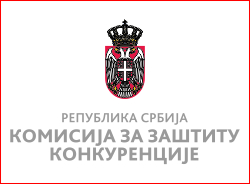 The Constitutional Court of the Republic of Serbia has reached the Conclusion, dismissing the proposal for assessment of constitutionality of the provision of Article 45 of the Law on Protection of Competition. The proposal for assessment of constitutionality of the provision of Article 45 of the said Law was made last July by the Commissioner for Information of Public Importance and Personal Data Protection.
The Constitutional Court of the Republic of Serbia has reached the Conclusion, dismissing the proposal for assessment of constitutionality of the provision of Article 45 of the Law on Protection of Competition. The proposal for assessment of constitutionality of the provision of Article 45 of the said Law was made last July by the Commissioner for Information of Public Importance and Personal Data Protection.
The above-mentioned provision of Article 45 of the Law relates to the obligation of the Commission for Protection of Commission to adopt a measure, at the request of a party, protecting the source of information or specific data if it is evaluated that the interest of that applicant is justified and substantially more important than the public interest in terms of the subject of said request.
The assessment of the Commissioner that the provisions of Article 45 of the Law on Protection of Competition governing “safeguard measures” with respect of information as implemented by the Commission for Protection of Competition are contrary to the arrangements made under the Law on Free Access to Information of Public Importance, is dismissed by the Constitutional Court in its conclusion reached during the session held on 25 April this year.
The Commission for Protection of Competition welcomes this move made by the Constitutional Court, noting that it contributes to the legal certainty of undertakings operating in the Republic of Serbia, but also to the harmonization of practice in cases pending before the Commission.
In proceedings pending before the competent competition authorities, including the Commission for Protection of Competition of the Republic of Serbia, but also the EU Directorate-General for Competition and Member States’ national competition authorities, undertakings submit numerous, highly sensitive business information, such as on suppliers and buyers, value and volume of sales and purchases, market shares, reasons for entering into a merger, agreements, acts containing business plans and future development strategies, etc., without which the Commission could not exercise its competences entrusted to it by the Law. – The disclosure of such information to the third parties could result in serious harm for the same undertakings providing the information, which caused the introduction of a rule in the comparative practice governing modus operandi of the competition authorities not to disclose nor make available any information or documentation containing trade secrets or other business sensitive information.
Such practice is also generally accepted in the EU competition law, since the EC Notice on the rules for access to the Commission file in antitrust cases, Guidance on the preparation of public versions of merger decisions, as well as the Guidance on the preparation of public versions of Commission Decisions adopted under the Merger Regulation, provide examples which confirm that information on buyers, distributors, market plans, costs and prices, as well as sales strategies or other commercially valuable plans need to be considered a trade secret whose access to file must be refused. Similar position and competences of national competition authorities are also reconfirmed by the Directive (EU) 2019/1 of the European Parliament to empower the competition authorities of the Member States to be more effective enforcers and to ensure the proper functioning of the internal market.



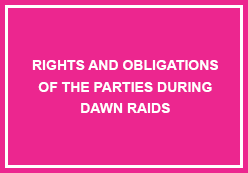
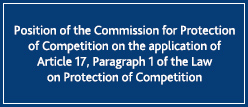
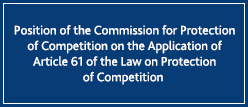
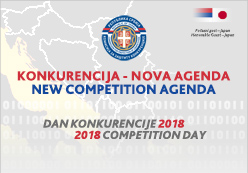
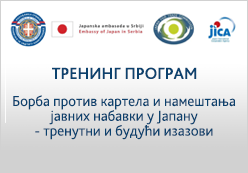


 The Commission for Protection of Competition is accountable for its work to the National Assembly, to which it submits annual activity reports. At the session held on March 27, 2019, the competent Parliamentary Committee discussed and adopted the 2018 Activity Report of the Commission for Protection of Competition.
The Commission for Protection of Competition is accountable for its work to the National Assembly, to which it submits annual activity reports. At the session held on March 27, 2019, the competent Parliamentary Committee discussed and adopted the 2018 Activity Report of the Commission for Protection of Competition.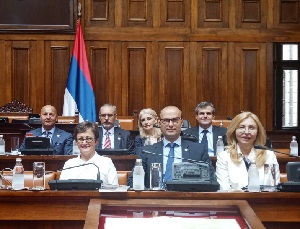
 The Commission for Protection of Competition hereby publishes the Notice of the Commitment Proposal, pursuant to Article 58 of the Law on Protection of Competition, which company EPS Distribucija d.o.o. Beograd is voluntarily willing to undertake in order to remove potential infringements of competition, with a call to all interested parties to submit written objections, positions and opinions on the proposed commitments.
The Commission for Protection of Competition hereby publishes the Notice of the Commitment Proposal, pursuant to Article 58 of the Law on Protection of Competition, which company EPS Distribucija d.o.o. Beograd is voluntarily willing to undertake in order to remove potential infringements of competition, with a call to all interested parties to submit written objections, positions and opinions on the proposed commitments.  The Commission for Protection of Competition has opened a special telephone hotline and email address for all parties in possession of information and other available facts of alleged instances of infringement of competition occurring on individual markets in the Republic of Serbia.
The Commission for Protection of Competition has opened a special telephone hotline and email address for all parties in possession of information and other available facts of alleged instances of infringement of competition occurring on individual markets in the Republic of Serbia. The Commission for Protection of Competition has established that Joint stock company for transportation services Niš-ekspres Niš has abused its dominant position on the bus station platform entrance market in the territory of the City of Niš, thus infringing competition rules from Article 16 of the Law on Protection of Competition.
The Commission for Protection of Competition has established that Joint stock company for transportation services Niš-ekspres Niš has abused its dominant position on the bus station platform entrance market in the territory of the City of Niš, thus infringing competition rules from Article 16 of the Law on Protection of Competition. President of the Commission for Protection of Competition Dr Miloje Obradović took part, with colleague Marija Antić, in the ordinary meeting of the Subcommittee on Internal Market and Competition, held in Brussels.
President of the Commission for Protection of Competition Dr Miloje Obradović took part, with colleague Marija Antić, in the ordinary meeting of the Subcommittee on Internal Market and Competition, held in Brussels.  The Commission for Protection of Competition of the Republic of Serbia has the administrative capacity, that is, qualitative experts to handle investigations on alleged infringements. The CPC’s investigations of large private and public companies have further contributed to improving its credibility and public image, says the 2019 EC Progress Report on Serbia, presented today at the Brussels headquarters of the European Commission.
The Commission for Protection of Competition of the Republic of Serbia has the administrative capacity, that is, qualitative experts to handle investigations on alleged infringements. The CPC’s investigations of large private and public companies have further contributed to improving its credibility and public image, says the 2019 EC Progress Report on Serbia, presented today at the Brussels headquarters of the European Commission.